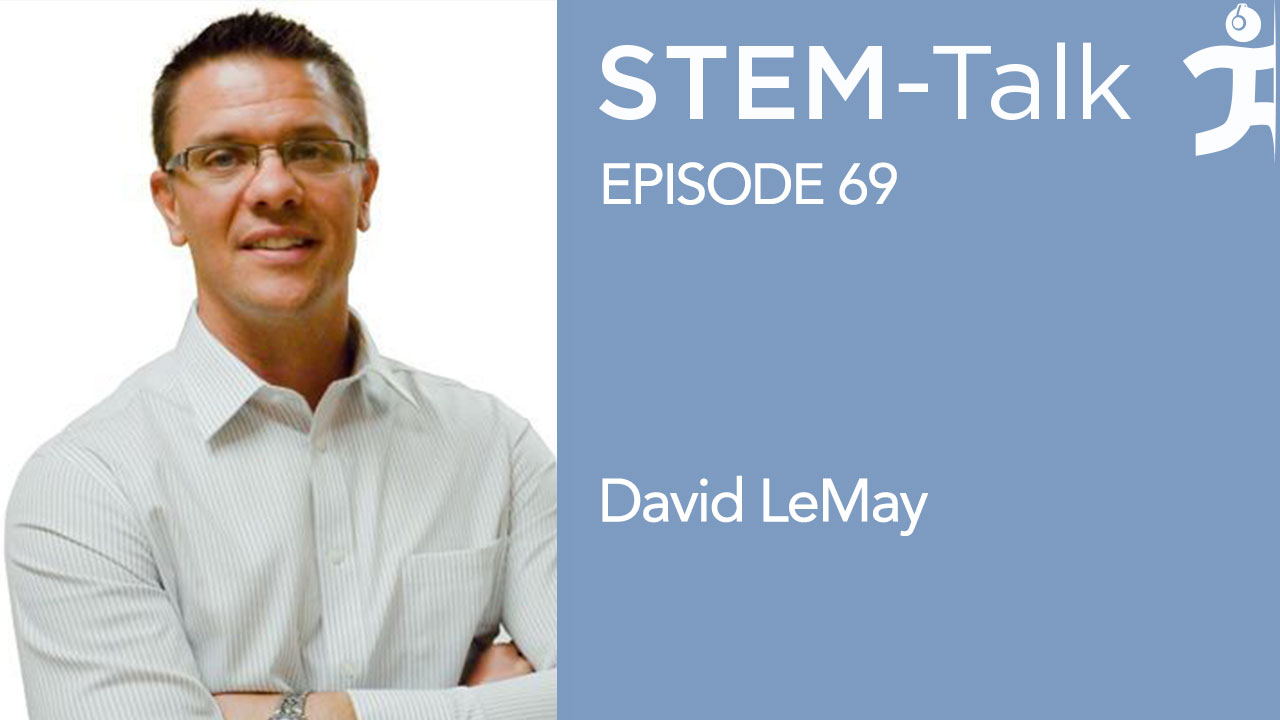STEM-Talk
Episode 69: David LeMay talks about countering inflammation with SPMs
// Jul 31, 2018

Dr. David LeMay is a sports medicine and rehabilitation physician who is a consultant for the NBA’s Washington Wizards, the NFL’s Oakland Raiders and the National Hockey League’s Washington Capitals, which won the Stanley Cup this year, their first in the franchise history.
Dave is also a neighbor of ours in Pensacola who has a practice called Lifestyle and Performance Medicine that is located just a few blocks from IHMC.
Dave and his practice partner provide personalized preventative care that helps people reduce the effects of stress on the body and mind to maximize function and health. In his practice, Dave works with a lot of athletes as well as retired and active military members, particularly people in special-ops, who have inflammation as a result of persistent injuries and traumas.
Dave often recommends specialized pro-resolving mediators, also known as SPMs, which help promote the natural termination of the inflammation process and allow a person to avoid anti-inflammatory drugs. We will especially be talking with Dave about this rather new way of treatment in today’s interview.
Some other topics we cover in Dave’s interview:
- Neuroendocrine dysfunction, especially among military veterans.
- The role of inflammation in concussions and traumatic brain injuries.
- Dave’s work with the NFL Players Association Trust.
- The role of specialized pro-resolving mediators in an aging population.
- The proper dosage of SPMs for subacute inflammation.
- Dave’s efforts to improve the diets of former NFL players.
- The key components of keeping athletes healthy through an entire season.
- The correlation between heath-rate variability and athletic performance.
- Proper sideline protocols for players who sustain head injuries.
- Optimal treatment for people who suffer TBI and concussions.
- Establishing baselines for a person’s neuroendocrine function.
- The role of DHA and EPA consumption for maintaining optimal brain health.
- And much, much more.
Show notes:
[00:04:18] Dave begins the interview talking about growing up in Reno, Nevada, and playing sports non-stop as a kid. [00:4:35] Dawn comments on how Dave’s love of sports lead to some injuries, including a few broken fingers and torn ligaments, and says she understands that this is how Dave first became interested in science. [00:05:31] Dawn asks Dave about his decision to head to California after high school to attend Azusa Pacific University. [00:06:37] Dawn asks what lead Dave back home to attend med school at the University of Reno. [00:07:13] Ken asks Dave at what point he decided to specialize in physical medicine and rehabilitation. [00:08:33] Dawn mentions that the University of Texas Health Science Center has one of the best physical medicine and rehab programs in the country. She asks Dave if this was the reason he decided to go there for his residency. [00:09:21] Ken comments on how after Dave’s residency, he stayed in Austin for almost a year. But then Dave moved Pensacola and Ken asks how that came about. [00:11:04] Dawn asks about Dave’s private practice, called Lifestyle and Performance Medicine, which he and his partner opened in 2013 after their time at the Andrews Institute. [00:11:27] Ken points out that veterans, and some active-duty folks, particularly those with special operations backgrounds, comprise about half of Dave’s practice. Ken says he understands Dave has seen a great deal of neuroendocrine dysfunction in this group, and asks Dave for his observations. [00:12:56] Ken mentions that Dave is the medical director for a program that is run through the NFL Players Association Trust. He asks Dave to describe the type of rehab that this program provides the former NFL players. [00:14:54] Dawn comments on the concept of inflammation being a unifying component of many diseases that afflict Western Civilization, and how it is also a major contributor to the magnitude and persistence of different sports injuries and traumas. She asks Dave to talk about inflammation, and specifically its role in concussion and TBI, as well as give a brief overview of what inflammation is. [00:17:51] Dawn mentions how Dave has been looking at how targeting inflammation may serve as a therapeutic way to also treat fear- and anxiety-based disorders. [00:20:34] Ken asks if the process of EPA and DHA conversion into SPM’s through an enzymatic process diminishes in its efficiency as one ages. [00:21:18] Ken asks if Dave thinks there is a role for exogenous SPM’s for the aging population. [00:22:13] Ken asks if there is a particular SPM brand, or collection of brands, that Dave finds to be the most interesting or efficacious. [00:23:01] Ken asks what dosage would Dave suggest for subacute inflammation, and what would be proper for an acute inflammation stage. He goes on to ask about those people who experience a constant, mildly inflamed state. [00:24:52] Ken asks how Dave wound up working as a consultant for the NBA’s Washington Wizards, the NFL’s Oakland Raiders, and the National Hockey League’s Washington Capitals, who won the Stanley cup this year. [00:26:35] Dawn mentions that Dave has been on the Performance Nutrition Advisory Board for EXOS for several years. She points out that one of the things Dave does when working with former NFL players is to walk them through ways to improve their diet. [00:28:19] Dawn asks what are the key components to keep athletes healthy, playing at a peak level throughout an entire season. [00:30:48] Ken asks if Dave ever looks at heart rate variability (HRV) as a way to measure the extent to which people are in a balanced state. [00:31:23] Ken mentions that the Ohio State wrestling team looked at HRV very closely, and that there has been found to be a direct correlation between the performance of the athletes and their HRV. He goes on to mention that in his own life, as well as with the wrestlers at Ohio State, the thing that seems to be the most effective in improving HRV is float tank experience. [00:32:55] Ken asks what the immediate and delayed symptoms of concussion and mild traumatic brain injury are that players experience, and what are the types of treatment that they typically go through? [00:35:15] Ken asks if, after an injury, coaches are still asking players on the sidelines questions like, “Who is the President?” [00:39:12] Ken mentions how he often wonders how much of the benefit of the float tank is from the transdermal magnesium. [00:40:01] Dawn asks if there are any efforts to track TBI in professional hockey, given that concussion is a concern in that sport with its high-speed pace and consequent impacts sustained by players during the game. [00:42:00] Dawn mentions how she appreciates Dave’s approach to TBI and concussion, which is to try to fix the issue from the inside out by getting at the core of the injury. She goes on to mention that Dave has discussed the need for individuals who have been diagnosed with TBI to see someone who practices something along the lines of integrated medicine to have a full system approach to their treatment. She inquires as to what an optimal care plan would look like for someone diagnosed with TBI [00:46:16] Ken mentions that in the Special Ops community, there is a lot of talk about establishing an individual baseline for each person’s neuroendocrine function since these men, prior to service, must have had robust levels of hormones such as testosterone, leading to their exceptional attributes and abilities. Thus the idea of determining their health by comparing their levels to what is considered “normal” for the general population doesn’t seem appropriate for this cohort group. [00:50:42] Dawn asks if Dave thinks that increasing DHA and EPA consumption would be beneficial for TBI patients. [00:52:06] Ken mentions how he once had the opportunity to suggest to a representative of the NFL that they should look at the APOE status for every player, and make the findings known to them. He went on to state that this suggestion was not warmly received. [00:55:13] Dawn comments on how there has been a potential link, suggested by the recent literature, between the uptake of DHA, an SPE precursor, and Alzheimer’s disease or dementia development. She goes on to mention a study done in 2017 that showed grey matter uptake in young adult APOE4 carriers is significantly higher than age-matched APOE4 non-carriers. APOE genotype has been shown to be a significant risk factor for development of Alzheimer’s. The thought is that increased uptake may be related to increased regional brain activation and higher cognitive abilities observed in young adult APOE4 carriers. As these young adults age, the hypothesis is that this greater uptake of DHA, which yields cognitive benefits at a younger age, also increases susceptibility to greater brain DHA loss due to increased metabolic demands and ultimately brain exhaustion and memory failure with age. Based on these and other recent findings, it has been suggested that APOE4 carriers should increase DHA consumption in order to meet the greater metabolic demand for DHA in the brain, and other clinical trials have reported cognitive benefits from increasing DHA consumption in cognitively healthy APOE4 carriers. Dawns asks Dave for his thoughts on the role of DHA or EPA consumption for maintaining or optimizing brain health? Or, she adds, would SPMs be more efficacious? [01:01:30] Dawn asks Dave what the role of genotyping will be in optimizing our nutrition, fitness, and overall wellness. [01:07:50] Ken asks what some of the common deficiencies and recommendations are for people who have trouble falling asleep, and also for those who have trouble staying asleep. [01:11:09] Dawn ends the interview asking Dave how he goes about taking care of himself, given his busy schedule, in terms of his diet and fitness routine.Links:
Concussion presentation by David LeMay
Sports Nutrition presentation by David LeMay
DHA brain uptake and APOE4 status
Resolution of inflammation is altered in Alzheimer’s disease
Infection regulates pro-resolving mediators that lower antibiotic requirements
Resolvins, specialized pro-resolving lipid mediators and their potential roles in metabolic diseases
Pro-resolving lipid mediators are leads for resolution physiology
Pro-resolving lipid mediators and mechanisms in the resolution of acute inflammation






